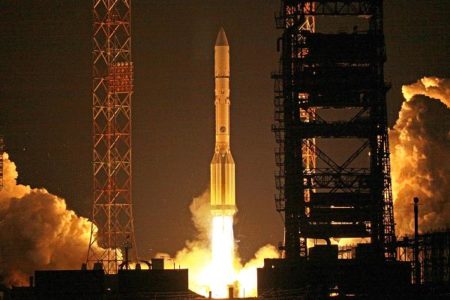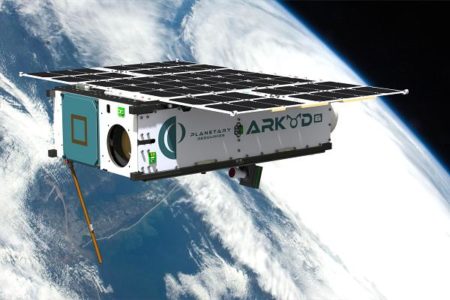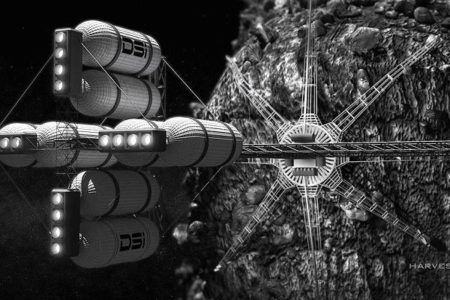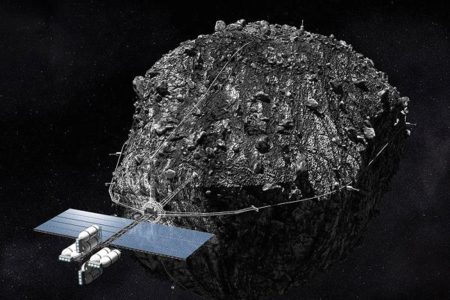by Andrew Zaleski | @ajzaleski
In the 1980s the tiny European nation of Luxembourg arose out of almost nowhere to become a leader in the satellite communications industry. Now it’s looking to the skies again, as it hopes to be the global leader in the nascent race to mine resources in outer space.

AP
A Russian Proton rocket booster blasts off from the Russian-leased Baikonur Cosmodrome in Kazakhstan. The rocket successfully launched the SES- 4 communication satellite for a Luxembourg-based SES company.
The prospect of asteroid mining, long the stuff of science fiction, is now being likened to a 21st-century gold rush. There’s a quest for resources among the stars, and asteroids are the prime targets, either for the metals they contain that could influence Earth-bound commodity markets, or for the water inside them that can be distilled into rocket fuel for future missions into deep space. Two of the leading companies in the field have been operating for several years already: Deep Space Industries, based in Mountain View, California, and Planetary Resources, based in Redmond, Washington. Unlike the days of the Apollo missions, this new generation of exploration is being led by a private sector interested in going boldly into space and in making money.

Source: Planetary Resources
The Planetary Resources’ Arkyd 6 asteroid miner is expected to launch this year. A sensor on board will not only prospect asteroids but also deliver actionable intelligence of the Earth to various global markets.
That’s where Luxembourg sees an opportunity to play host to entrepreneurs and start-ups with their sights on space, becoming the worldwide hub of the space mining industry in the process. Private space exploration is a brand new market with trillions of dollars in potential; the Federal Aviation Administration expects space tourism to be a $1 billion sector over the next several years. Meanwhile, noted experts like Neil deGrasse Tyson has said that the world’s first trillionaire “will be the person who exploits the mineral content of metallic asteroids.”
Asteroids, floating pieces of rock and metal that predominate between Mars and Jupiter, are veritable treasure chests, packed with gold, platinum, and alloys that are needed to produce modern technologies such as smartphones.
If you’re looking to make billions, try mining an asteroid 9:53 AM ET Fri, 13 April 2018 | 01:42
“Our goal is to put into place an overall framework for the exploration and commercial use of resources from ‘celestial bodies’ such as asteroids, or from the moon,” said Etienne Schneider, Luxembourg’s Deputy Prime Minister and Minister of the Economy.
Tax haven for space ventures
Sandwiched by Germany, Belgium, and France, the country with a population of 582,000 and a per capita GDP of just over $101,000 is stable and largely politically neutral. Historically, it was a steel producer, but in more recent decades it is better known for private banking, low taxes, and, sometimes to the country’s chagrin, as a tax haven; multinational companies use tiny Luxembourg for corporate tax avoidance much in the same way they use one of its neighbors, the Netherlands.

Richard Elliott | Stone | Getty Images
City of Luxembourg
An adventurous and unproven enterprise like space mining requires the financial backing, legal frameworks, and favorable regulatory structures that allow the work to even take place. Luxembourg has expertise in that area, given its experience in the mid-1980s with the commercial satellite industry. Up until that decade, satellites in space were government-funded or government-mandated. That changed in the 1980s, and Luxembourg led the charge in the satellite communications industry when it launched Société Européenne des Satellites in 1985. Otherwise known as SES, it was Europe’s first private satellite operator; today, Luxembourg’s SES is the world’s second-biggest commercial satellite operator.
More from Global Investing Hot Spots:
The $5 billion South Korean start-up that’s an Amazon killer
Emerging markets maven Mark Mobius to launch new firm
Tech investors in Apple and other stocks in crosshairs of trade war
“Smaller countries can really make a big impression if they focus,” said Peter Stibrany, chief strategist at Deep Space Industries, a VC-backed company seeking to process materials mined from asteroids wholly in space. “Luxembourg focused on satellite communications and made a huge success of it, and now they’re focused on asteroid mining.”
“Our goal is to put into place an overall framework for the exploration and commercial use of resources from ‘celestial bodies’ such as asteroids, or from the moon.”-Etienne Schneider, Luxembourg’s Deputy Prime Minister and Minister of the Economy
It started in 2016 when Luxembourg established the Space Resources initiative and earmarked $223 million of its national space budget to provide early-stage funding and grants to companies working toward space mining. In the event more money is needed, Luxembourg “will be able to provide that money,” Schneider said at a press conference announcing the funding in June 2016.
Deep Space Industries and Planetary Resources are already working closely with Luxembourg’s government. Stibrany said the government contributed an undisclosed amount of R&D funding to Deep Space Industries. And in November 2016, Planetary Resources and Luxembourg struck a deal: $28 million in investment from the Grand Duchy in exchange for an undisclosed equity stake in the company. Planetary Resources doesn’t disclose its total funding, but CEO Chris Lewicki said Luxembourg was “one of the largest investors” in the company’s Series A round.
“They believe it is a foundational business that will grow,” said Lewicki, a NASA veteran who was flight director for two Mars rover missions.

Bryan Versteeg | Deep Space Industries
Both companies predict that as soon as the mid-2020s, water, hydrogen, oxygen, and precious metals will be able to be extracted, processed, and utilized, either as fuel for deep-space missions to Mars and beyond, or as commodities on Earth. A Goldman Sachs research report published last year noted that mining asteroids “could be more realistic than perceived,” and cited figures from Planetary Resources calculating that the platinum found on an asteroid the size of one football field is worth anywhere between $25 billion and $50 billion.
The mechanics of actually mining an asteroid are still being worked out, but companies like Deep Space Industries envision a future where robotic harvesting spacecraft touch down on an asteroid’s surface — already resource-mapped by tiny prospecting satellites — and extract the materials contained inside.
Government support
Perhaps even more important than the funding is the regulatory structure Luxembourg has set up. In 2017 it became the first European country to pass a law conferring to companies the ownership of any resources they extract from space. The U.S. has a similar law for commercial space exploration, the Commercial Space Launch Competitiveness Act, which became law in 2015. But while the U.S. law applies solely to people and companies that count as citizens, Luxembourg’s law applies to any company with a Luxembourg address.
Luxembourg’s jump into asteroid mining has drawn criticism. Speaking to The Guardian last September, UC Berkeley assistant professor of economics Gabriel Zucman — who studied under French economist Thomas Piketty — said Luxembourg’s strategy of creating laws and making room for asteroid mining companies “is what being an offshore financial center means. It’s not diversification. It’s just extending the logic of being a tax haven to a new area.”
In other words, Luxembourg isn’t necessarily jumping into modern technology with its support of space mining — it’s just pushing into a new industry to extend the laws of a terrestrial tax haven, safeguarded by a sovereign nation, to the land of E.T.

Bryan Versteeg | Deep Space Industries
But Luxembourg shows no signs of slowing its movement into asteroid mining. Deputy Prime Minister Schneider said the country has “several more tools to further support and enable commercial space entities and space resources companies.” Forthcoming is a homegrown space agency with an investment fund supported by the government and venture capitalists. And Schneider has already said Luxembourg is prepared to reimburse asteroid mining companies up to 45 percent of their R&D costs.
Asteroid mining companies will take all the help they can get.
“These things are not all in place yet. There’s continuing work to make that happen,” said Deep Space Industries’ Stibrany. “It’s extremely supportive to have a state with a government … to create the right environment for this sort of activity.”
Source: https://www.cnbc.com/2018/04/16/luxembourg-vies-to-become-the-silicon-valley-of-asteroid-mining.html


